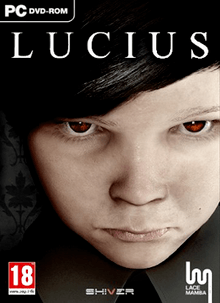Lucius (video game)
| Lucius | |
|---|---|
 | |
| Developer(s) | Shiver Games |
| Publisher(s) |
|
| Designer(s) |
Johannes Aikio Heikki Pulkkinen |
| Programmer(s) | Henrik Lidstrom |
| Artist(s) | Alessandro Laina |
| Composer(s) | Foz |
| Platform(s) | Microsoft Windows |
| Release | 26 October 2012 |
| Genre(s) | Survival horror |
| Mode(s) | Single-player |
Lucius is a psychological horror stealth video game developed by Shiver Games and published by Lace Mamba Global for Microsoft Windows. It is centered on the six-year-old boy Lucius, who is the son of Lucifer. Players take control of Lucius as he murders members of his household, using powers of telekinesis and mind control to orchestrate deadly accidents that lead to the deaths of multiple residents of Dante Manor. Players use their wits and follow hints to ensure they do not leave any evidence that would lead to a mission failing. A sequel, Lucius II: The Prophecy, was announced on August 8, 2014, and was released on February 2015.[1]
Plot
When Lucius was born on the date of June 6th, 1966, nobody expected him to be anything other than a normal little boy. His childhood, spent in the luxurious manor on the private estate of his father, Charles Wagner and his wife, Nancy, was as normal as every kid's young years, excluding the extreme wealth of his parents. The luxurious wealth his family has is, in part, due to Lucius's grandfather, Fabius's past ties to the mob. After celebrating on the night of his sixth birthday, he is visited by Lucifer, who instructs him to lock a maid in the freezer. While Lucius is asleep, he once again visits him, this time revealing himself to be Lucius's true father. Before sending him off, he gives Lucius a task: as part of a debt the family owes, Lucius must kill everyone who resides in the manor. The next morning, a detective, McGuffin, is sent to investigate the death.
Over the next few months, Lucius carefully picks off the manor's inhabitants through both supernatural powers and problem-solving; all of the murders are assumed to be accidents by McGuffin. The poisoning of one of the manor's inhabitants leads to further investigation. After catching his uncle Tom having an affair with one of the housemaids, Lucius plants false evidence that pits the blame on another maid, Jovita. Following Jovita's death, Lucius kills an alcoholic and repressed Tom by poisoning one of his bottles using a vial hidden in a satanic ritual room located in the manor's wine cellar. When Fabius, refuses to attend Tom's funeral, Charles begins to become suspicious of him. McGuffin, having been sent away by a grieving Charles, confesses to his sins and sends two priests to the manor. Fabius sends the priests away and knocks out a journalist who had broken into the manor for a story. Realizing Lucius's true calling, he awakens Lucius and the two sneak off to a hidden room where they plan on sacrificing the journalist. Deducing that Fabius is no longer necessary for him to complete his mission, Lucius betrays Fabius by stabbing him the back, his blood filling the bowls on the table instead of the journalists. The journalist, no longer unconscious, battles Lucius but is killed by Lucius -- who uses his pyrokinetic abilities.
The disappearance of the journalist lands McGuffin in trouble and while trying to find Fabius, Charles finds one of his books dedicated to satanic ritual. Now fully aware of his father's dark past, Charles theorizes that Lucius has become cursed as a result of Fabius's actions. As he tries to find evidence to prove this to a mentally-deteriorated Nancy, Lucius plants a nail-gun and forces him to kill her. McGuffin gives chase and Lucius is put into the care of Deputy Terrence, who was sent to accompany McGuffin earlier. After Lucius kills Terrence, he manages to set the manor ablaze. As the manor is quickly engulfed in flames, Charles returns with two priests to fend off Lucius. Should Lucius assault all three at once, he will crush Charles to death with a pillar and meet McGuffin (face to face) as he leaves the manor. Should he, instead, choose to pick them off one at a time, he will nearly be killed by Charles. McGuffin, arriving on the scene, kills Charles before he can lower a Fire Extinguisher on Lucius' head. McGuffin leaves the manor with Lucius, still clueless of the fact that Lucius was responsible for all of the deaths, setting up the events for Lucius II: The Prophecy.
Reception
| Reception | ||||||||||||||||||
|---|---|---|---|---|---|---|---|---|---|---|---|---|---|---|---|---|---|---|
| ||||||||||||||||||
Lucius received mixed reviews from critics. It received a score of 58.00% on GameRankings[2] and 59/100 on Metacritic.[3] Gaming website GameSpot said "the biggest problem is a lack of information; tips are given [...] but the core aspects of the game are not explained well".[6] In a negative review, Adventure Gamers stated that "much of the writing and voice acting is mediocre at best".[4]
References
- ↑ O'Connor, Alice (8 August 2014). "Sandbox Sataning: Lucius 2 Announced". Rock, Paper, Shotgun. Retrieved 8 August 2014.
- 1 2 "Lucius (PC)". GameRankings. Retrieved 2012-11-05.
- 1 2 "Lucius Critic Reviews for PC". Metacritic. Retrieved 2012-11-05.
- 1 2 Nathaniel Berens. "Lucius Review". Adventure Gamers. Retrieved 2012-10-26.
- ↑ Jim Sterling. "Review: Lucius". Destructoid. Retrieved 2012-11-06.
- 1 2 Brett Todd. "Lucius Review". GameSpot. Retrieved 2012-10-26.